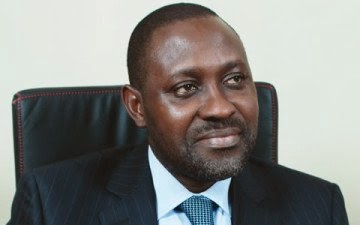Raise gas price to bridge $55b funding gap, says Oando chief
By Unknown - Tuesday, April 21, 2015
Nigeria has to raise its gas prices to attract an estimated $55 billion investment needed to plug persistent local shortages, the Nigerian Gas Association (NGA) said yesterday.
Its President, Bolaji Osunsanya, said a government increase of gas prices in August last year for power plants to $2.50 for 1,000 cubic feet from about $0.50 isn’t enough.
Osunsanya, who is also the Managing Director, Oando Gas & Power Ltd., said these investments were needed to explore for more gas, set up five processing facilities at about $2 billion each and develop domestic distribution channels.
International oil companies (IOCs) which had been export-focused due to low domestic gas prices fixed by the government, have agreed to sell off $10 billion of assets over the past three years, according to Bloomberg Intelligence. Those assets are largely being taken over by local companies, such as Seplat Petroleum Development Co. and Midwestern Oil and Gas Co. Ltd.
Oando’s $1.65 billion acquisition of ConocoPhillips’s Nigerian oil and gas assets in June made it the country’s biggest indigenous gas producer, with a production of more than 50,000 barrels of oil equivalent.
“We should incentivise people with the best reward and encourage people to come into the fold. The strategicness of gas is what I wish Nigeria would take more seriously,” he said.
Chairman, Nigerian Electricity Regulatory Commission (NERC), Dr. Sam Amadi, lamented that the electricity industry is being hindered by producers’ inability to raise finance and natural gas shortages, curbing companies’ capacity to boost investment in output thus plunging the country into daily blackouts.
Head, Energy Research at Ecobank Transnational Inc., Dolapo Oni, said the gas sector has not been given the desired attention. He said: “Nigeria hasn’t given its gas sector the attention it should. From the domestic side of things, gas can transform the power sector.”
While Nigeria was the world’s fourth-biggest exporter of liquefied natural gas in 2012, it is struggling to meet local demand for the fuel used by plants that generate at least 70 per cent of the country’s electricity needs. The country, which holds Africa’s biggest gas reserves of more than 180 trillion cubic feet (Tcf), is expanding pipeline networks so that they can service power plants and industries and not just exports.
“We should encourage more exploitation to bring out the gas for domestic (use). A lot of it needs to come quickly because there’s an existing power side that requires a lot of gas,” Osunsanya said.
Its President, Bolaji Osunsanya, said a government increase of gas prices in August last year for power plants to $2.50 for 1,000 cubic feet from about $0.50 isn’t enough.
Osunsanya, who is also the Managing Director, Oando Gas & Power Ltd., said these investments were needed to explore for more gas, set up five processing facilities at about $2 billion each and develop domestic distribution channels.
International oil companies (IOCs) which had been export-focused due to low domestic gas prices fixed by the government, have agreed to sell off $10 billion of assets over the past three years, according to Bloomberg Intelligence. Those assets are largely being taken over by local companies, such as Seplat Petroleum Development Co. and Midwestern Oil and Gas Co. Ltd.
Oando’s $1.65 billion acquisition of ConocoPhillips’s Nigerian oil and gas assets in June made it the country’s biggest indigenous gas producer, with a production of more than 50,000 barrels of oil equivalent.
“We should incentivise people with the best reward and encourage people to come into the fold. The strategicness of gas is what I wish Nigeria would take more seriously,” he said.
Chairman, Nigerian Electricity Regulatory Commission (NERC), Dr. Sam Amadi, lamented that the electricity industry is being hindered by producers’ inability to raise finance and natural gas shortages, curbing companies’ capacity to boost investment in output thus plunging the country into daily blackouts.
Head, Energy Research at Ecobank Transnational Inc., Dolapo Oni, said the gas sector has not been given the desired attention. He said: “Nigeria hasn’t given its gas sector the attention it should. From the domestic side of things, gas can transform the power sector.”
While Nigeria was the world’s fourth-biggest exporter of liquefied natural gas in 2012, it is struggling to meet local demand for the fuel used by plants that generate at least 70 per cent of the country’s electricity needs. The country, which holds Africa’s biggest gas reserves of more than 180 trillion cubic feet (Tcf), is expanding pipeline networks so that they can service power plants and industries and not just exports.
“We should encourage more exploitation to bring out the gas for domestic (use). A lot of it needs to come quickly because there’s an existing power side that requires a lot of gas,” Osunsanya said.



0 Comments